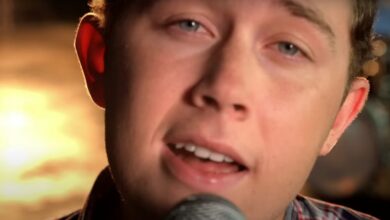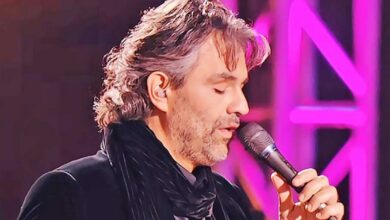Kelly Clarkson’s Rendition Of ‘The Dance’ Moved Garth Brooks To Tears
During the 43rd Kennedy Center Honors, which took place on June 6, 2021, the spotlight shone brightly on Kelly Clarkson as she delivered an emotionally charged performance of Garth Brooks’ cherished song “The Dance.” This annual ceremony is dedicated to recognizing individuals who have made a significant impact in the arts and, in 2021, honored a memorable roster that included Debbie Allen, Joan Baez, Dick Van Dyke, and the virtuoso violinist Midori. Hosted by the radiant Gloria Estefan, the event featured an array of performances by esteemed artists, extending the celebratory atmosphere and creativity that characterizes the Kennedy Center Honors.
Clarkson’s haunting rendition of “The Dance” stood out not only for its technical proficiency but for the deep emotional connection she forged with both the song and its honoree, Garth Brooks. Originally released in 1989 as part of Brooks’ debut album, “The Dance” encapsulates themes of love, loss, and the poignancy of life’s fleeting moments. Clarkson’s interpretation was marked by a delicate piano arrangement that underscored her powerful vocals, adding layers of vulnerability and depth that resonated with the audience. Her ability to convey such profound emotion allowed viewers to experience the heart of the song, transforming it into a personal narrative of her own journey.
As Garth Brooks looked on from the audience, visibly moved by Clarkson’s heartfelt tribute, the power of music to evoke emotion was palpable. Tears welled in his eyes as he observed Clarkson breathe new life into his beloved classic, illustrating the enduring connection between artists and their work. In the context of her own life, Clarkson has openly discussed how “The Dance” has played a crucial role in her healing process following her divorce from Brandon Blackstock. The song’s message of reflection and acceptance resonated deeply with her personal experiences, serving as a poignant soundtrack to her emotional recovery.
Kelly Clarkson, born on April 24, 1982, in Fort Worth, Texas, first captured the nation’s attention as the winner of the inaugural season of “American Idol” in 2002. This breakout moment launched her into superstardom, leading to a prolific career marked by numerous chart-topping hits like “Since U Been Gone,” “Stronger (What Doesn’t Kill You),” and “Piece by Piece.” Over the years, Clarkson has amassed a remarkable collection of accolades, including multiple Grammy Awards and American Music Awards, cementing her status as a powerhouse in the music industry. Beyond her musical achievements, she has also carved out a successful niche on television as the host of “The Kelly Clarkson Show,” and as a coach on NBC’s “The Voice,” showcasing her multifaceted talent.
The Kennedy Center Honors provided a platform for Clarkson to exhibit her versatility as a performer while also paying homage to the legacy of Garth Brooks. Her sensitive approach to “The Dance” emphasized the timeless quality of his work and reaffirmed her role as a bridge between different generations of music lovers. The event not only celebrated Brooks’ contributions to the country genre but also highlighted Clarkson’s artistry and emotional range, making it a memorable evening for all in attendance.
The positive reception of Clarkson’s performance underscores the potency of music as a universal language that can convey complex emotions and experiences. Her rendition of “The Dance” elicited enthusiastic responses from both the live audience and viewers at home, reminding everyone of the powerful connection music fosters within individuals and among communities. It serves as a testament to the timeless nature of songs, which can evoke memories and feelings long after their initial release, as evidenced by Brooks’ enduring popularity.
As Clarkson’s performance echoed throughout the Kennedy Center, it became clear that such moments contribute significantly to the cultural fabric of society. Music has the extraordinary ability to transcend time and space, connecting people through shared experiences of joy, sorrow, and understanding. In this light, Clarkson not only honors Brooks but also joins a legacy of artists who strive to create meaningful connections through their craft, respecting the past while simultaneously shaping the future of music.
Artistic moments like these forge bonds between artists and fans, illustrating how music can provide solace and inspire resilience. “The Dance” has found new life through Clarkson, inviting both old and new fans to engage with its powerful message. As she navigates her path as an artist, Clarkson continues to be a source of inspiration, reminding us of the healing power of music and the importance of honoring those who shaped the sounds we cherish.
In retrospect, Clarkson’s stirring tribute during the Kennedy Center Honors stands as a defining highlight, marking a pivotal moment in her career. It reaffirmed her as a significant voice in contemporary music while also honoring the contributions of Garth Brooks, thus encapsulating the essence of the event itself. The performance not only brought Brooks’ classic song into a new light but also carved out a space for Clarkson to shine, adding her unique perspective and emotional authenticity to a timeless piece of American music history. Her performance will be remembered as not just a tribute but as a heartfelt sharing of emotion, connecting diverse audiences through the simple power of song.
?





